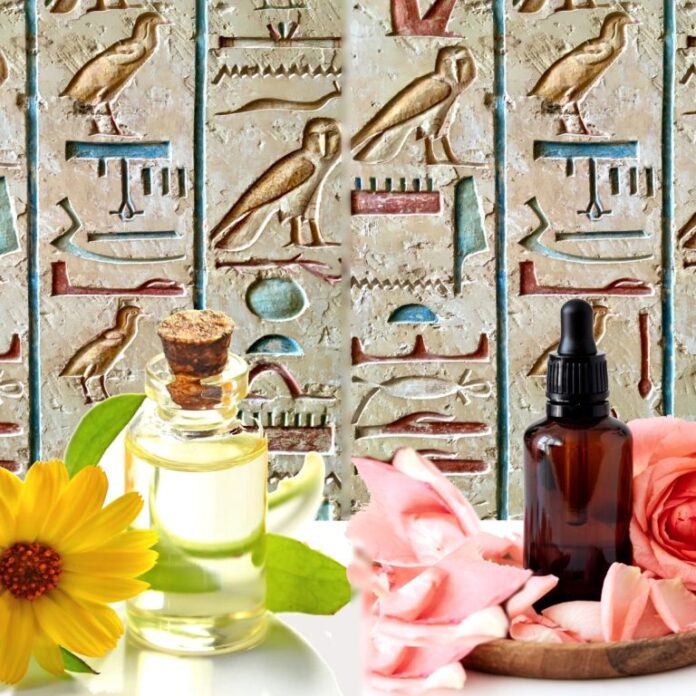Perfume and cologne have become a part of everyday life for many. Whether it is a subtle fragrance to give a boost of confidence, or a luxurious scent to impress, the use of perfume and cologne has been around for centuries. In this blog post, we will be uncovering the history of perfume and cologne in Ancient Egypt, Ancient Greece and Ancient Rome, and how it has evolved from ancient to medieval times. We will also explore the use of essential oils in aromatherapy, who invented perfume and the difference between perfume and cologne, and perfume tips and tricks.
Introduction to the History of Perfume & Cologne
The history of perfume and cologne dates back to ancient times. In Ancient Egypt, people used fragrances to eliminate odors and to attract good luck and health. In Ancient Greece, perfume was used as an offering to the gods and as a way to honor them. In Ancient Rome, perfume was used as a symbol of social status and to signify wealth. Throughout the ages, the use of perfume has evolved and changed, with new ingredients and methods of production being developed.
The use of perfume and cologne has been a part of many cultures for centuries. In the Middle Ages, perfumes were used to attract potential mates, and it was believed that certain fragrances could enhance a person’s attractiveness. In the Renaissance and Baroque periods, the use of perfumes and colognes was a way to express opulence and wealth. Today, perfume is still a way to express one’s self and to make a statement.
Evolution of Perfume From Ancient to Medieval Times
Perfume has evolved significantly over the centuries, and its use has changed in different eras. In the Middle Ages, perfumes were made with natural ingredients such as flowers, herbs, and spices. These ingredients were distilled and mixed with oils to make fragrances. In the Renaissance, perfume was made with rose water, cinnamon, and ambergris. In the Baroque period, perfume makers began to use synthetic ingredients in their perfumes, such as musk and civet.
The use of perfume in the Middle Ages was not just for scent, but also for medicinal purposes. In ancient Egypt, perfumes were used to treat different ailments such as headaches, fever, and even depression. In Ancient Greece and Ancient Rome, perfumes were used to treat respiratory conditions and to calm the nerves. During the Middle Ages, perfume was also used to treat ailments such as scurvy and gout.
Perfume in Ancient Egypt
In Ancient Egypt, perfume was used for religious ceremonies and was believed to bring good luck and health. The most popular ingredients used in perfumes were cedarwood, frankincense, myrrh, and galbanum. These ingredients were combined with oils and distilled to create fragrances. The Egyptians also created a type of solid perfume called “kyphi” which was made from resins, honey, and wine. This solid perfume was used to treat headaches and to attract good luck.
Egyptian perfumes were also used for burial ceremonies. It was believed that the scent of the perfume would help the spirit of the deceased ascend to the afterlife. In addition, perfume was used to honor the gods and goddesses. It was believed that the gods and goddesses had a special affinity for certain scents, and so offerings of perfumes were made in their honor.
Perfume in Ancient Greece and Ancient Rome
In Ancient Greece, perfume was used as a way to honor the gods and goddesses. The Greeks believed that certain scents had the power to attract the gods and goddesses, and so they made offerings of perfumes to them. In addition, the Greeks also used perfume for medicinal purposes. They believed that certain scents could cure illnesses and ailments, and so perfumes were used to treat conditions such as headaches, fever, and depression.
In Ancient Rome, perfume was used as a symbol of social status and to signify wealth. The Romans often used perfumes to enhance their appearance, and it was believed that certain fragrances could make a person more attractive. The Romans also used perfume for medicinal purposes, and it was believed that certain scents could cure illnesses and ailments.
Aromatherapy and the Use of Essential Oils
Aromatherapy is a form of alternative medicine that uses essential oils to promote physical, emotional, and spiritual well-being. Essential oils are highly concentrated plant oils that are extracted from flowers, leaves, and other parts of the plant. These oils are then used in massage, baths, and other treatments.
Essential oils have been used for centuries in many cultures, including Ancient Egypt, Ancient Greece, and Ancient Rome. In Ancient Egypt, essential oils were used to treat various illnesses and ailments, such as headaches and fever. In Ancient Greece and Ancient Rome, essential oils were used to enhance beauty and to attract potential mates.
Who invented perfume and the difference between perfume and cologne
The invention of perfume is often attributed to the Ancient Egyptians, but it is likely that it was developed by multiple cultures over time. The first recorded use of perfume was in Ancient Egypt, where it was used for religious ceremonies and to attract good luck and health.
Perfume and cologne are similar, but there are some key differences. Perfume is a more concentrated form of fragrance, and it is typically more expensive than cologne. Perfume is also generally more complex in scent than cologne, and it typically contains more floral and woody notes. Cologne is a lighter, more subtle scent and is often more affordable than perfume.
Perfume in the Renaissance and Baroque Periods
In the Renaissance and Baroque periods, the use of perfumes and colognes was a way to express opulence and wealth. During this time, perfume makers began to use synthetic ingredients in their perfumes, such as musk and civet. They also began to use alcohol as a base for their perfumes, which allowed for a stronger and longer-lasting scent.
In addition to being used as a status symbol, perfume was also used to enhance beauty. Perfumes were used to attract potential mates, and it was believed that certain fragrances could make a person more attractive. During this time, perfumes were also used to mask unpleasant odors and to ward off disease.
Perfume Tips and Tricks
If you are looking to make the most of your perfume, there are a few tips and tricks that can help. First, it is important to store your perfume in a cool, dark place. Heat and light can cause the scent of the perfume to fade, so make sure to keep it out of direct sunlight.
Second, it is important to apply your perfume in the right places. The best places to apply perfume are the pulse points, such as the wrists, neck, and behind the ears. Applying perfume in these areas will help the scent last longer and will make it more noticeable.
Finally, it is important to apply your perfume correctly. When applying perfume, it is best to spray it in the air and then walk through the mist. This will help the scent to spread evenly and will make it more noticeable.
The Science Behind Perfume
The science behind perfume is complex and fascinating. Perfumes are made up of a combination of volatile oils, alcohols, and other ingredients. These ingredients are carefully blended together to create fragrances that are unique and long-lasting.
The scent of a perfume is made up of three main components: the top notes, the middle notes, and the base notes. The top notes are the first scent that you will notice when you smell a perfume, and they are typically made up of citrus and floral scents. The middle notes are the heart of the perfume and are usually made up of spices, herbs, and woods. The base notes are the last to be noticed, and they are usually made up of musk, civet, and other animalistic scents.
Conclusion
Perfume and cologne have been around for centuries, and their use has changed over time. In Ancient Egypt, perfume was used for religious ceremonies and to attract good luck and health. In Ancient Greece and Ancient Rome, perfume was used as a symbol of social status and to signify wealth. In the Middle Ages, perfume was used to attract potential mates, and in the Renaissance and Baroque periods, it was a way to express opulence and wealth. Today, perfume is still a way to express one’s self and to make a statement.
Perfume and cologne have come a long way since their beginnings in ancient times. With the help of modern science and technology, perfumers are now able to create complex and long-lasting fragrances that can be enjoyed by all. So the next time you spritz on your favorite scent, take a moment to appreciate the long and aromatic history of perfume!
In this modern era, to find the best perfume or clone, the best thing to do is Online shopping, especially with Perfumania Coupons, is the best way to get the most exquisite perfumes and colognes at the lowest prices. Shopping online with Perfumania Coupons gives customers the opportunity to get the best deals and discounts on their favorite fragrances. Customers who shop with Perfumania Coupons can save even more money on their favorite scents by using Perfumania Coupon codes.





